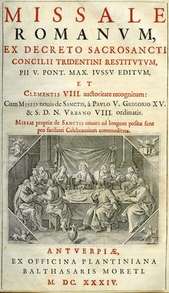
Within the Canon the Church mentions by name two lists of saints who were martyred during the first four centuries after the Death of Christ.
St. Paul assures us that we are "fellow-citizens o f the saints," (Eph. 2. 19) and that we can draw upon their immense spiritual credit balance. The saints of the Canon make up for our deficiencies. We, as members of the Communion of Saints, are never alone in offering the Holy Sacrifice. The Canon saints are active in our cause praying the Mass with us and for us.
In human society the presence of distinguished persons adds dignity to an occasion and makes us more attentive and respectful. Judge then the Mass by those who are present and what they expect from us. On the altar and around it are the angels and the saints with Christ their Head. Let us think over this often and thus enrich our offering of the Mass.
Some day we hope to meet the Canon saints in heaven. In preparation for that happy meeting let us get to know something about them now and so widen our friendship.
The rubrics instruct the celebrant to bow his head to the Missal on mentioning the name of the saint on his feast-day. Let us join in that delightful little courtesy and so win the saint's affection and help. To remind us to do this we should put an asterisk in red ink on the feast day Masses of the Canon saints in our daily missals.
The aim of these articles is to introduce the saints of the Canon by short sketches of their lives and death so that when we name them in the Canon we know something about them.
The third prayer of remembrance before the consecration commemorates by name, Mary, the Queen of Martyrs, the twelve Apostles, and twelve Roman Martyrs. There is proportion and symmetry in the arrangement of names, which might be graphically expressed thus: 1 + 12 + 12. The martyrs mentioned are Roman martyrs, with the exception of St. Cyprian, Bishop of Carthage, whose cult was warmly received by the people of Rome ever since his martyrdom at Carthage.
The "Communicantes" honours the Church Triumphant for it adds to the list of names the words - "and of all Your saints." In this remembrance in the Canon of the Mass we ask "through the merits and prayers" of this mighty host of God's saints in Heaven that "we may be defended in all things by the help of Your protection."
THE "COMMUNICANTES" PRAYER.
"In communion with, and venerating the memory
Mary heads the List
"in the first place of the glorious ever Virgin Mary, Mother of our God and Lord Jesus Christ; also of Your blessed Apostles and Martyrs,
Twelve Apostles
"Peter and Paul,
Andrew, James, John, Thomas, James, Philip, Bartholomew, Matthew, Simon and Thaddeus,
Five Popes
"Linus, Cletus, Clement, Xystus, Cornelius,
An African Bishop
"Cyprian,
Archdeacon of Rome
"Lawrence,
Five Laymen
"Chrysogonus, John and Paul, Cosmas and Damian,
Saints in general
"and of all Your Saints; by whose merits and prayers grant that we may be defended in all things by the help of Your protection. Through the same Christ Our Lord. Amen."
The Blessed Virgin Mary, Mother of God.
The Blessed Virgin, Queen of Martyrs, heads the list with the title "Mother of God" which was formally bestowed upon her at the general council convoked by Pope St. Celestine at Ephesus, the city of the Blessed Virgin, in 431, and held in the Cathedral dedicated to her honour. The heresy of Nestorius, who said there were two persons in Christ, divine and human, and that Mary was the mother only of the human, was condemned and the title "Mother of God" was approved. This Pope Celestine sent St. Patrick to Ireland in 432, the year following Ephesus.
Mary's name is not mentioned simply as the other names are, but with great dignity: she is the "glorious," the "ever virgin." Mary's name is inseparable from the Sacrifice of Christ. He came first in emptying Himself. Mary comes next for she gave more than Apostles and martyrs, and thus understands the sacrifice of giving. She "stood by the Cross of Jesus," and great as the sea was then her sorrow. She is justly called the Queen of Martyrs.
Whenever a soul comes to God in Holy Mass he does so in communion with Mary. Let us bring Mary with us whenever we come to Mass. She knows that the more a soul gives itself into His hands, the more perfectly does He work for its sanctity. No one has abandoned herself to Him as Mary has. No one has placed fewer obstacles in the way of His Will than Mary. She knows me far better than I know myself. She knows why I am unwilling to be subject to Him, why I hesitate to surrender myself to Him, and she will help me to beat down the resistance I put in His way. When He sends suffering and crosses to open our hearts to the height and depth and width and length of His Love for us, and we are reluctant to receive them as gifts from Him, Mary will strengthen us with a Mother's love to accept them.
Never come to Mass without calling upon her in words such as the priest says in the prayers preparing for Mass:
"O Mother of piety! O Mother of Mercy, most blessed Virgin Mary, I, a wretched and unworthy sinner, cling to you with all the affection of my heart, and I appeal to your piety, that as you stood by the Cross of your Son, so you will assist me, poor sinner that I am, and all the priests who here, and throughout the world, offer the holy sacrifice today so that it may be a worthy and acceptable offering in the sight of the Blessed Trinity,"




